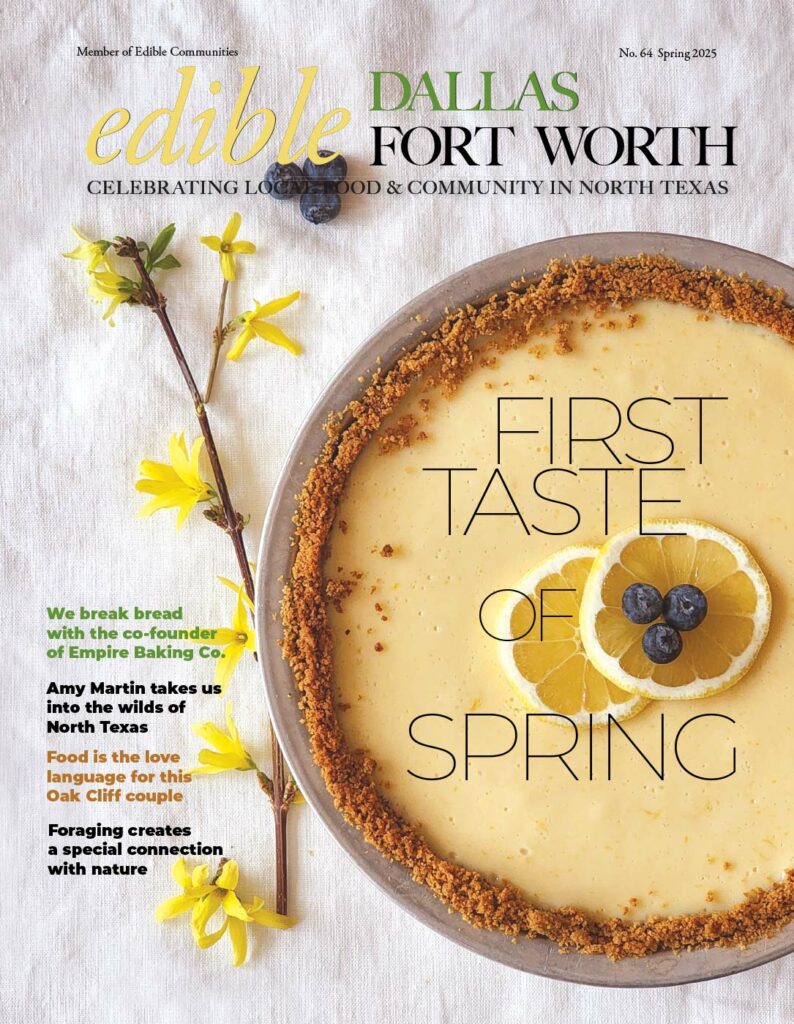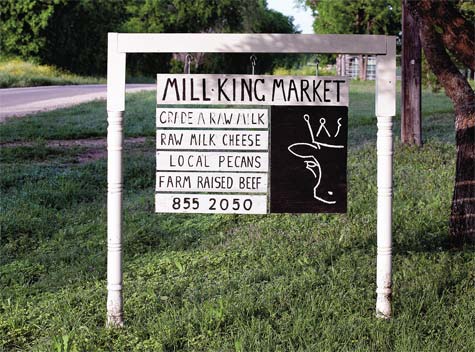
Photography by Kelly Yandell
Waco, like many Texas cities, is ever expanding into the countryside. But just west of the city in the small town of Mc- Gregor, a beautiful, still-bucolic parcel of land is home to grazing cows and some of the nicest dairy farmers you would ever care to meet. The Miller family—Craig, his parents Charlotte and Billy, his wife Rhianna, and sister Casie Velin—operate Mill-King Market and Creamery, one of a growing number of independent Texas dairies abandoning the conventional approach to marketing milk.
This third-generation dairy farm is slowly reducing its conventional herd, selling less milk through co-ops and focusing efforts on marketing its premium dairy products. “We are shrinking, not expanding like a conventional dairy has to do to survive,” says Craig. By culling their herd to 100 exceptional cows, Craig believes his family’s dairy will be more manageable, as well as more profitable.
“We control one hundred percent of the process,” Craig says. When asked about the rarity of a start-to-finish, independent dairy where a consumer could actually document the exact origin of their glass of milk, he says they’ve been moving to keep tabs on, better control of and make available that high-quality glass of milk for 30 years.
The Millers are preserving and enhancing the traits of their best cows through a well-managed breeding program. Their select herd produces milk with a higher than average milk fat and protein content. “Right now our Holsteins are producing milk with 4.5% butterfat, richer than your average Jersey,” says Craig. The conventional system, according to Craig, does not reward a farmer for an above average product. Conventional dairy farming utilizes co-ops where members pool their milk and sell the combined yield to wholesalers for a negotiated price. “If I’m producing a premium product,” says Craig, “I still get paid the same.”
These days, milk from the Millers’ select herd is reserved for the Mill-King label, and their products are generating robust sales. In the DFW area, they can be found at Whole Foods and at smaller retailers like Green Grocer and Urban Acres and for home delivery through Greenling. Mill-King also markets its cream and half and half to independent coffee shops. “Why would you put low-end milk in a $5 coffee drink?” asks Craig, adding that coffee shops use a lot more dairy than people realize
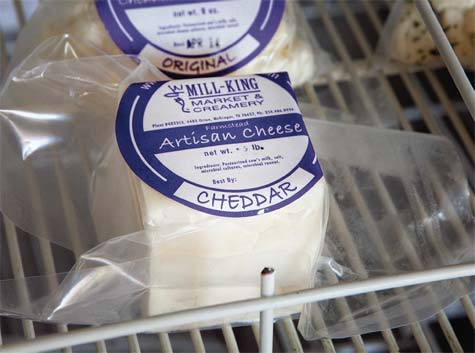
With their premium milk, the Millers also make cheese and are in the process of creating a line of Greek, standard and drinkable yogurts. “Many people who do not drink any milk, eat yogurt every day for breakfast,” notes Craig. In addition to outside retail outlets, the Millers sell their raw milk at their farm store and their low-temperature pasteurized milk at various farmers markets, along with their cheeses, eggs and beef.
The entire family lives on or around the farm. The dairy business and cows have been their life for three decades. Charlotte, affectionately known as “Shorty,” is matriarch of the family. She takes care of the baby calves until six weeks of age. “She teaches them how to drink out of a bucket and doctors them,” says Craig. “It is the hardest job on the dairy.” She can also be found in the cheese production room, packaging milk and preparing for the next round of cheese making.
Billy oversees the herd’s feed intake, the health of the herd and personnel issues. Rhianna manages cheese production and handles the accounting and scheduling. Casie helps out at the farmers markets and whenever the dairy needs a spare hand. Craig not only manages the reproductive health of the herd, but he also consults with other dairies on genetic issues. To stay competitive, the Millers consistently look to new technologies to improve their operational efficiency. Craig is hoping that by reducing the herd his parents will be able to slow down a bit. “Seven days a week for 20 years is just too much.”
Keeping the business small and family-oriented often means bottling milk at 1 a.m. and loading the delivery truck at 3:30 a.m., all of which is done by the family and a few employees. When asked what makes Mill-King different from an average conventional dairy, Craig responded that it had a lot to do with how they take care of their cows. They are pasture-fed and their nutrition is closely monitored. The farm runs heat abatement systems to keep the cows comfortable in the hot months. He says that a defining difference is simply the “general day to day care of the animals that my parents give from birth on.” When one considers the price of a half-gallon of milk, this daily devotion should be factored into the equation.
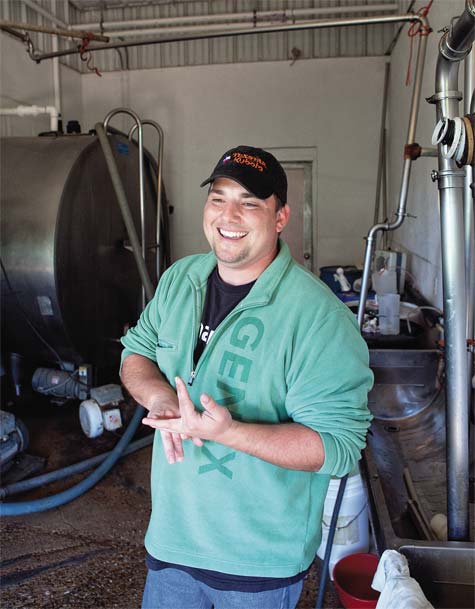
Craig Miller
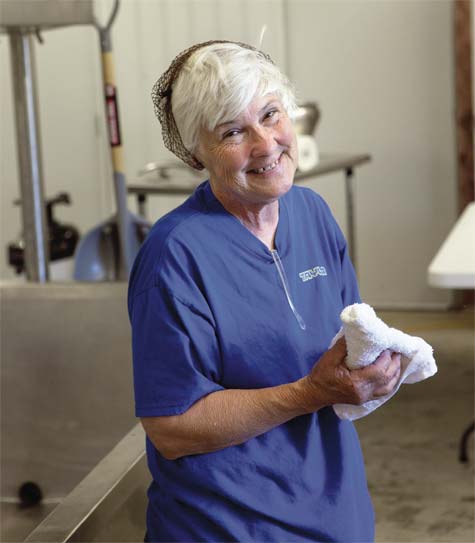
Charlotte Miller
A smaller herd, a full-cycle dairy, excellent animal care and a quality product —when you drink a cold glass of Mill-King milk or nibble on a chunk of their exceptional Asiago cheese, you know precisely what you are getting. You are getting day-in and day-out attention to detail. In sum, you are getting the Millers.
KELLY YANDELL is a writer and photographer based in Dallas. She has contributed to Edible Dallas & Fort Worth since 2011. Her website (themeaningofpie.com) celebrates practical dishes and comfort foods, while her photography portfolio can be found at kellyyandell.com. Kelly is an attorney and is the vice president of the Advisory Board of Foodways Texas, an organization founded by scholars, chefs, journalists, restaurateurs, farmers, ranchers, and other citizens of the state of Texas who have made it their mission to preserve, promote and celebrate the diverse food cultures of Texas.
- Kelly Yandellhttps://www.edibledfw.com/author/kyandell/
- Kelly Yandellhttps://www.edibledfw.com/author/kyandell/
- Kelly Yandellhttps://www.edibledfw.com/author/kyandell/
- Kelly Yandellhttps://www.edibledfw.com/author/kyandell/


